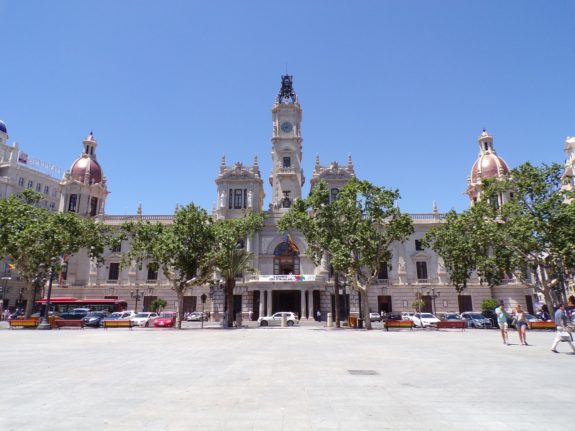La renta – Spain’s yearly tax campaign opens
Spain’s annual income tax return is called ‘la declaración de la renta‘ or simply la renta for short. This year, you must file your taxes for the previous financial year – that is to say, 2023. This year, the campaign starts on Wednesday 3 April. From this date, you can present your taxes for 2023 online.
According to Spain’s tax agency the Agencia Tributaria, nine out of every 10 declarations are done online. The campaign runs until July 1st this year. This means that you have a little less than 3 months in order to take your papers in order and submit your returns. Many foreigners in Spain opt for the services of a gestor to help them through the bureaucratic maze.
READ ALSO: What does a ‘gestor’ do in Spain and why you’ll need one
The basic rule applied to determine residency when it comes to tax is the 183 days rule: “If you stay in Spain for more than 183 days during the calendar year,” you are usually considered a tax resident here state Spain’s Tax Agency (Agencia Tributaria). You probably don’t need to hand in a tax return if you earn less than €22,000 a year and you pay tax on your salary and your bank interest throughout the year. As such, la renta is mostly for self-employed people and small business owners.
Festivals and events
April also sees a number of festivals and events happening across Spain.
Día de Sant Jordi or San Jorge
April 23rd marks St George’s Day and while it’s not celebrated all over the country, for certain regions it’s one of the most important days of the year. In Catalonia, Día de Sant Jordi is a celebration of the region’s patron saint and it is marked by the gifting of books and roses. Many towns and cities will be draped in the traditional red and yellow stripes of the Catalan flag, while dragons and roses decorate shop windows and squares.
READ ALSO: Why St George’s Day is celebrated in Catalonia with roses and books
April 23rd is also the Día de Aragón and a public holiday in the region. Like Catalonia, St George is also the patron saint of Aragón and the region celebrates with flower displays, cultural performances and family meals. St George’s Day is also recognised in the Balearic Islands and some places in Valencia and is marked with similar celebrations to Aragón and Catalonia.
Día del libro
April 23rd also coincides with UNESCO’s World Book Day (Día del libro), as it celebrates the anniversary of the deaths of William Shakespeare and famed Spanish author of Don Quixote, Miguel de Cervantes.
Though it is an internationally celebrated event, you might not have known that it has its roots in Spain. The original idea of celebrating Book Day came from Catalonia, more specifically from the Valencian writer Vicente Clavel Andrés, who proposed the celebration to Barcelona’s Chamber of Books in 1923. It was later approved by King Alfonso XIII in 1926.
Seville’s Feria de Abril
Seville’s April Fair is one of the city’s most anticipated festivals in Andalusia, celebrating true Andalusian culture with lots of flamenco performances, passionate music and incredible colourful costumes.
This year, it takes place from Sunday April 14th to Saturday April 20th. There will be lots of decorations, fairground rides, horse and carriages and casetas or marquees where the locals meet to dance and party.
The Moros y Cristianos Festival (Alcoy)
Moors and Christians festivals are held typically throughout the spring and summer seasons, but one of the best takes place in April in the town of Alcoy in Alicante.
This year it takes place from April 20th-22nd. It commemorates the historical events that took place in 1276, related to the uprisings of the Muslims who inhabited the area, and takes you back in time to the Reconquista battles that saw the forces of the Catholic monarchs unite Spain. It too honours the patron saint of St George. During the event, teams dress up as Crusaders and Arabs to re-enact the battles.
Seville to restrict holiday lets
Seville is expected to become the first city in Andalusia to limit the number of holiday rental properties following a decree by the Junta de Andalucía. Spanish media reports suggest that the plans will be approved “at the end of April” and a limitation on the number of tourist lets per neighbourhood will be introduced.
An increase in the number of tourist rentals (usually referred to as pisos turísticos in Spanish) catering to remote workers and digital nomads, combined with a post-pandemic surge in travel and costs, has caused price inflation in the property market across Spain in recent years. Recent data shows that in the old town of Seville, a staggering 61.2 percent of residential homes are used for tourism.
Basque regional elections
Spain’s seemingly never-ending run of elections continues in April with a regional poll in the Basque Country. The election will be held on Sunday, 21st April, and come at a particularly tense time in Spanish politics as Socialist (PSOE) Prime Minister Pedro Sánchez faces a political storm following the passing of a controversial amnesty law for Catalan separatists involved in the failed 2017 independence referendum.
READ ALSO: Spain finally passes controversial amnesty law for Catalan separatists
As such, the backlash over the amnesty will likely feature heavily on the campaign in the Basque Country (as it did in recent regional elections in Galicia) and Sánchez’s reliance on Basque separatist parties in Congress.
New bus prices in Barcelona
For those living in or visiting Barcelona, in April your bus journeys to and from the airport will begin to be a little more expensive. From April 1st, fares on the Aerobus service connecting Barcelona and El Prat Airport will increase by 7.4 percent, following a decision by Barcelona council.
Metro tickets in the city also went up by 6.75 percent in January, although the 50 percent discount on the T-Jove and T-Usual travel cards was maintained. The cards were originally due to expire on 15 January, but will now be valid until 30 April 2024.
New early morning Madrid-Barcelona AVE train launches
Renfe will launch a new early morning AVE high-speed train between Barcelona and Madrid on 8th April. It will run from Monday to Thursday, departing at 5.40am and arriving at 8.20am, half an hour earlier than the first AVE service currently on offer.
The early morning service will leave Barcelona-Sants station at 5.40am, stop at Zaragoza at 7.02am and arrive at Madrid-Puerta de Atocha-Almudena Grandes at 8.20am.
Ban on certain smoking products
April will also see the banning of some tobacco products widely consumed in Spain.
In April, new legislation will come into force prohibiting the sale of all heated tobacco products that contain flavours and aromas, as well as making it mandatory for companies to include health warnings.
READ ALSO: Spain bans flavoured heated tobacco products
The ban will also be extended to marketing tobacco products that have aromas or flavourings in their components, such as in filters, smoking papers, packaging or capsules, or any other technique that allows the smell to be modified.
April weather forecast
April also sees spring really kick into gear in Spain. After an extremely warm winter (featuring the hottest January in Spain on record) spring has already started off with plenty of rain, even cancelling some Semana Santa processions across the country. Forecasts seem to predict that the high temperatures will continue, with warmer than normal temperatures expected in April and throughout spring in most parts of the country.
READ ALSO: Rain in Spain mars Holy Week parades
Temperatures will be especially high in the eastern half of the peninsula and in both the Balearic and Canary Islands, according to El Tiempo’s forecast.
Forecasts from Spain’s state meteorological service Aemet suggest there will be “normal” rainfall in April and throughout spring.



 Please whitelist us to continue reading.
Please whitelist us to continue reading.
Member comments